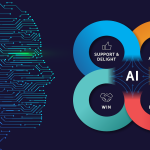In today’s rapidly evolving world, the impact of automation and artificial intelligence (AI) on the job market cannot be underestimated. As technology continues to advance, it brings with it both opportunities and challenges for the workforce of the future. In this blog post, we will explore the key challenges that individuals, businesses, and societies will face in an increasingly automated world.
Automation: A Double-Edged Sword
Automation has been a driving force behind increased productivity and efficiency in various industries. From manufacturing to customer service, machines and algorithms are taking over tasks that were once performed by humans. While this can lead to cost savings and improved output, it also raises concerns about job displacement. As repetitive and routine tasks become automated, many workers find themselves at risk of unemployment or underemployment.
The Skills Gap

One of the most significant challenges in the face of automation is the growing skills gap. As technology advances, the demand for workers with specialized skills in fields like AI, data science, and cybersecurity is on the rise. However, many workers lack access to the necessary education and training to acquire these skills. Bridging this gap is essential to ensure that individuals can adapt to the changing job landscape.
Job Polarization
Automation doesn’t affect all jobs equally. It tends to polarize the job market, creating a divide between high-skill, high-wage jobs and low-skill, low-wage jobs. Middle-skill jobs that involve routine tasks are the most vulnerable to automation. This polarization can exacerbate income inequality and make it even harder for those in lower-wage jobs to escape poverty.
Economic Disruption
The widespread adoption of automation can lead to economic disruption, affecting entire industries and communities. When industries become automated, they may no longer require the same number of workers, leading to job losses and potentially causing economic downturns in regions heavily reliant on those industries. This disruption can be particularly challenging for communities that lack economic diversification.
The Need for Lifelong Learning

To thrive in an automated world, individuals must embrace the concept of lifelong learning. As job roles evolve and new technologies emerge, workers will need to continuously update their skills and knowledge. Employers, too, must invest in training and upskilling their employees to ensure they remain competitive in a rapidly changing landscape.
Adapting Business Models
Businesses also face significant challenges in adapting to an automated world. While automation can lead to cost savings, companies must invest in technology and reconfigure their business models to take full advantage of automation. Moreover, they must carefully consider the ethical and social implications of automation, as public perception and trust can play a significant role in a company’s success.
Social Safety Nets
With the potential for job displacement due to automation, social safety nets become crucial. Governments and societies must develop policies and programs to support workers who lose their jobs due to automation. This may include unemployment benefits, job placement assistance, and retraining programs to help individuals transition into new roles. The future of jobs in an automated world is filled with both challenges and opportunities. While automation can lead to increased productivity and efficiency, it also poses significant risks in terms of job displacement, income inequality, and economic disruption. To navigate these challenges successfully, individuals, businesses, and societies must be proactive in addressing the evolving nature of work and the skills required to thrive in the digital age. By investing in education, training, and social safety nets, we can work towards a future where automation complements human capabilities rather than replaces them.






